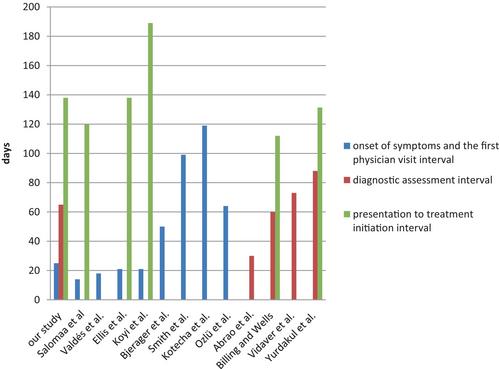Evaluating the Time Interval Between Symptoms Onset, Diagnosis, and Therapeutic Intervention in Lung Cancer: A Cross-Sectional Study in Southern Iran
Abstract
Background and Aim
Delay in diagnosis and treatment of lung cancer is thought to be a major cause of its poor outcomes. We evaluated the delays within the presentation to the initiation of diagnostic and therapeutic interventions amongst lung cancer patients in Southern Iran.
Methods
This cross-sectional study was conducted from March 2019 to March 2021. The data collected through interview included socio-demographic, medical and clinical findings, and the time intervals needed to visit physician, refer to specialist, request diagnostic procedures, reach diagnosis of lung cancer, and hospitalization.
Results
Eighty-nine patients (58 males and 31 females) with a mean age of 61.01 ± 12.25 years were included. The median time of symptom presentation and first physician visit interval was 25 days. Sixty-five days were spent for requesting, performing, and evaluating the diagnostic procedures. The median interval between diagnosis and initiation of treatment was 16 days. Totally, it took an average of 122 days from the presentation to the definite diagnosis of lung cancer. Patient-, diagnosis-, and treatment-related delays were not significantly correlated with any of the demographic, socioeconomic, and clinical (disease stage, symptom) variables, as well as the diagnosis tool and the first physician who visited the patient (p > 0.05).
Conclusions
There was a significant delay but relatively similar to other countries in the diagnosis and treatment of lung cancer patients in Southern Iran. The largest portion of delay could be attributed to the raising clinical suspicion in the physicians, referral for diagnostic assessments, and the diagnosis process.


 求助内容:
求助内容: 应助结果提醒方式:
应助结果提醒方式:


